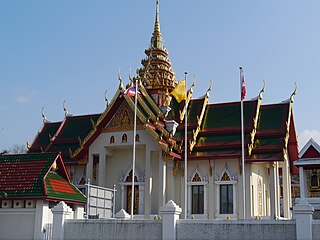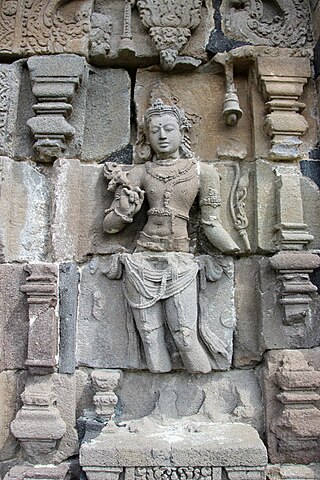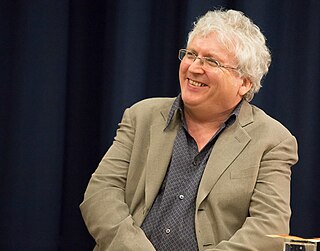Related Research Articles
Buddhism in the West broadly encompasses the knowledge and practice of Buddhism outside of Asia in the Western world. Occasional intersections between Western civilization and the Buddhist world have been occurring for thousands of years. The first Westerners to become Buddhists were Greeks who settled in Bactria and India during the Hellenistic period. They became influential figures during the reigns of the Indo-Greek kings, whose patronage of Buddhism led to the emergence of Greco-Buddhism and Greco-Buddhist art. There was little contact between the Western and Buddhist cultures during most of the Middle Ages but the early modern rise of global trade and mercantilism, improved navigation technology and the European colonization of Asian Buddhist countries led to increased knowledge of Buddhism among Westerners. This increased contact led to various responses from Buddhists and Westerners throughout the modern era. These include religious proselytism, religious polemics and debates, Buddhist modernism, Western convert Buddhists and the rise of Buddhist studies in Western academia. During the 20th century, there was a growth in Western Buddhism due to various factors such as immigration, globalization, the decline of Christianity and increased interest among Westerners. The various schools of Buddhism are now established in all major Western countries making up a small minority in the United States, Europe, Australia and New Zealand.
The World Fellowship of Buddhists (WFB) is an international Buddhist organization. Initiated by Gunapala Piyasena Malalasekera, it was founded in 1950 in Colombo, Ceylon, by representatives from 27 nations. Although Theravada Buddhists are most influential in the organization,, members of all Buddhist schools are active in the WFB. It now has regional centers in 35 countries, including India, the United States, Australia, and several nations of Africa and Europe, in addition to traditional Buddhist countries.
Engaged Buddhism, also known as socially engaged Buddhism, refers to a Buddhist social movement that emerged in Asia in the 20th century, composed of Buddhists who are seeking ways to apply the Buddhist ethics, insights acquired from meditation practice, and the teachings of the Buddhist dharma to contemporary situations of social, political, environmental and economic suffering, and injustice. Finding its roots in Vietnam through the Thiền Buddhist teacher Thích Nhất Hạnh, Engaged Buddhism was popularised by the Indian jurist, politician, and social reformer B. R. Ambedkar who inspired the Dalit Buddhist movement in the 1950s, and has since grown by spreading to the Indian subcontinent and the West.
Buddhism is a legally recognized religion in Austria. Although still small in absolute numbers, Buddhism in Austria enjoys widespread acceptance. A majority of Buddhists in the country are Austrian nationals, while a considerable number of them are foreign nationals.

With nearly 250,000 Buddhists, Brazil is home to the third-largest Buddhist population in the Americas, after the United States and Canada. Buddhism in Brazil consists of practitioners from various Buddhist traditions and schools. A number of Buddhist organisations and groups are also active in Brazil, with nearly 150 temples spread across the states.

Buddhism in Germany looks back to a history of over 150 years. Arthur Schopenhauer was one of the earliest Germans who were influenced by Buddhism. Schopenhauer got his knowledge of Buddhism from authors like Isaac Jacob Schmidt (1779-1847). German Buddhists or Orientalists like Karl Eugen Neumann, Paul Dahlke, Georg Grimm, Friedrich Zimmermann and the first German Buddhist monk Nyanatiloka Mahathera were also influenced by Schopenhauer and his understanding of Buddhism. But also German Indologists like Hermann Oldenberg and his work ”Buddha, sein Leben, seine Lehre, seine Gemeinde“ had an important influence on German Buddhism.

Buddhism is a minority religion in Switzerland. According to the 2000 census, 21,305 Swiss residents self-identified as Buddhists. About a third of them were born in Thailand.

Although there was regular contact between practising Buddhists and Europeans in antiquity the former had little direct impact. In the latter half of the 19th century, Buddhism came to the attention of Western intellectuals and during the course of the following century the number of adherents has grown. There are now between 1 and 4 million Buddhists in Europe, the majority in Italy, Germany, France and the United Kingdom.
David Robert Loy is an American scholar, author and authorized teacher in the Sanbo Zen lineage of Japanese Zen Buddhism.
Herbert Vighnāntaka Günther was a German Buddhist philosopher and Professor and Head of the Department of Far Eastern Studies at the University of Saskatchewan, Saskatoon, Canada. He held this position from the time he left India in 1964.
Buddhism in the United Kingdom has a small but growing number of adherents which, according to a Buddhist organisation, is mainly a result of conversion. In the UK census for 2011, there were about 247,743 people who registered their religion as Buddhism, and about 174,000 who cited religions other than Christianity, Buddhism, Hinduism, Judaism, Islam, Jainism and Sikhism. This latter figure is likely to include some people who follow the traditional Chinese folk religion which also includes some elements of Buddhism.
Buddhism is a small minority religion in the Netherlands, but it has shown rapid growth in recent years. As of the 2006 estimate, 170,000 Dutch people identified their religion as Buddhist.

Arya Maitreya Mandala is a tantric and Buddhist order founded 1933 by Lama Anagarika Govinda.

The many different varieties of Buddhist art often show buddhas and bodhisattvas, as well as depictions of the historical Buddha, known as Gautama Buddha.

Lama Jampa Thaye is a teacher of the Sakya and Karma Kagyu traditions of Tibetan Buddhism. He has been teaching for over 30 years and is the spiritual director of the Dechen organisation of Buddhist Centres. He is the author of several books on Tibetan Buddhism and has a PhD in Tibetan Religions from the University of Manchester. He is renowned for being one of the first Westerners who are authorised to transmit Vajrayana teachings.
Buddhism in Hungary has existed since 1951 when Ernő Hetényi founded the Buddhist Mission in Germany, as a member of the Arya Maitreya Mandala Buddhist order. However, the first Buddhist community had been founded in the 1890s in Máramarossziget. József Hollósy took refuge and wrote Buddhista Kátét (1893) — the first Buddhist catechism in Hungarian. According to this, the Dharma has been present in Hungary for more than a century. In 1933 the Hungarian philologist and Orientalist — author of the first Tibetan-English dictionary and grammar book Sándor Kőrösi Csoma — was recognised as a bodhisattva in Japan. In Hungary József Hollósy is regarded as the second bodhisattva.
Deutsche Buddhistische Union is a German national umbrella organisation for Buddhist associations registered in Germany. DBU has estimated that there are 250 000 Buddhists in Europe and the religion is growing. As of June 2021 DBU has 62 member organizations.
Federación de Comunidades Budistas de España is a Spanish organisation that functions as an umbrella organisation to the country's Buddhist communities.
References
- ↑ From the 'EBU Statement of Mission and Vision', adopted by the EBU Annual General Meeting, September 2013
- ↑ European Buddhist Union, The History of EBU
- ↑ Johnson, Todd M.; Grim, Brian J. (2013). The World's Religions in Figures: An Introduction to International Religious Demography. Hoboken, NJ: Wiley-Blackwell. p. 34
- ↑ Arena – Atlas of Religions and Nationalities in Russia. Sreda.org
- ↑ Baumann, Martin (2010). European Buddhist Union, in: Religions of the World: A Comprehensive Encyclopedia of Beliefs and Practices., ABC-CLIO, S. 1016-1017.
- ↑ Council of Europe's Conference of International Non-Governmental Organisations, list of participating NGO's
- ↑ Human Rights Committee
- ↑ European Network of Religion and Belief, ENORB
- ↑ EU Charter of Fundamental Rights